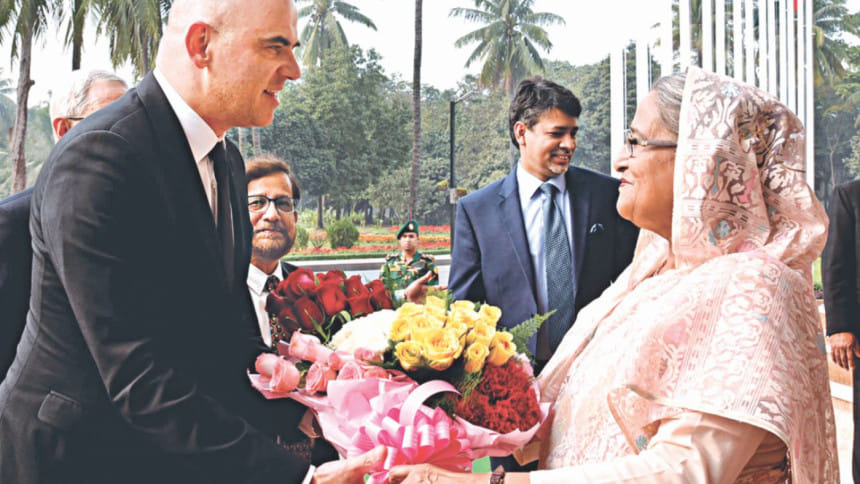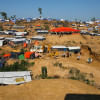Swiss president for safe return of Rohingyas

Visiting Swiss President Alain Berset yesterday said the situation of Rohingyas was of great concern to his country and laid emphasis on their safe and voluntary repatriation to Myanmar.
Berset, who arrived in Dhaka on a four-day official visit on Sunday, appreciated Bangladesh for its role in dealing with the biggest humanitarian crisis.
"Switzerland commends your government and the people of Bangladesh for the solidarity, assistance and protection offered to the Rohingyas," Berset said in a statement after his official talks with Prime Minister Sheikh Hasina at the latter's office.
Stating that the root of Rohingya problem lies in Myanmar, Hasina urged the international community, including Switzerland, to mount pressure on Myanmar for an early peaceful solution to the crisis.
The PM came up with the call in a statement after the meeting.
The Swiss president said Switzerland pledged eight million Swiss francs [equivalent to $8 million] at a conference in Geneva in October for emergency humanitarian aid for the Rohingya refugees in Bangladesh.
“And I'm very pleased to announce today [yesterday] that this year Switzerland will provide an additional 12 million francs [equivalent to $12 million] for the Rohingya refugees.”
He said the agreement on repatriation between Bangladesh and Myanmar was a positive step towards a solution to the current crisis.
“It'll be important that all returns are voluntary and safe, and carried out with dignity," said the Swiss president.
Berset will visit Cox's Bazar today to see Rohingya situation on the ground.
He will visit Kutupalong Rohingya camp. The Swiss president will also talk to journalists at the camp.
Berset will return to the capital in the afternoon and meet civil society representatives.
In her statement, Hasina said, "We had a productive meeting today [yesterday]. We've discussed the Rohingya crisis during bilateral talks. I shared that as the root of the problem lies in Myanmar, the solution has to be found in Myanmar.”
“I put emphasis on full and immediate implementation of the recommendations of the Kofi Annan Commission Report, as that will be critically important for the sustainable return of the Rohingya people, in safety and dignity, to their homes in Myanmar," the PM said.
At yesterday's meeting, she said they discussed the 2030 Agenda for Sustainable Development, which provides a unique opportunity to build new global partnerships.
Hasina said both the countries yesterday agreed to conclude a framework of MoU on collaboration on matters related to the implementation of the Agenda 2030 in near future.
A joint declaration identifying the key areas for broader cooperation between the two countries was issued yesterday, she said.
“We may now ask our respective authorities to develop a roadmap for the implementation of our joint undertakings in a time-bound manner for the shared prosperity of the two states,” she added.
She thanked Berset for making his historic first-ever official visit to Bangladesh and termed it a milestone in 45 years of diplomatic relations between the two countries.
Hasina recalled her visit to Switzerland in December 2000 at the invitation of the then president of the Swiss Confederation.
Switzerland was among the first few West European countries to recognise Bangladesh as an independent state on March 13, 1972. Since then, Switzerland became an important development partner and a time-tested friend, she said.
Hasina appreciated the role played by Switzerland regarding the Rohingya crisis at different United Nations forums and beyond.
"I'm very happy to learn that high-powered business delegations from both the countries exchanged views in the first-ever high-level Bangladesh-Swiss Business and Investment Forum held today [yesterday]."
She hoped that Swiss companies would explore business opportunities in Bangladesh, and invited them to participate in sectors like oil and gas exploration, power and energy, critical infrastructure development, ICT, banking and insurance, and pharmaceuticals.
Terming the relations between Switzerland and Bangladesh good, Swiss President Berset said Switzerland with this visit demonstrated its support and solidarity for Bangladesh during the Rohingya crisis.
"The bilateral relations between our countries are good. We've had the opportunity to exchange today [yesterday] on areas -- trade, development cooperation, cultural exchanges and climate change -- where both the countries see a strong potential for development of our relations," he said in another statement.
He also greeted Bangladesh as it was heading towards emerging a middle-income nation. "We also welcome efforts in improving the business climate, legal security and the need for a sustainable business environment, including respect for human rights."
Mentioning that the bilateral trade between the two countries has almost doubled over the past seven years, he said, "It's my firm belief that the Swiss-Bangladeshi trade and investment will reach new heights in the future."
Switzerland is very much interested in continuing this path with the government of Bangladesh, the private sector and civil society organisations, said Berset, adding that a particular focus on the next couple of years will be on social inclusion, economic development, governance and safe migration.

 For all latest news, follow The Daily Star's Google News channel.
For all latest news, follow The Daily Star's Google News channel. 








Comments